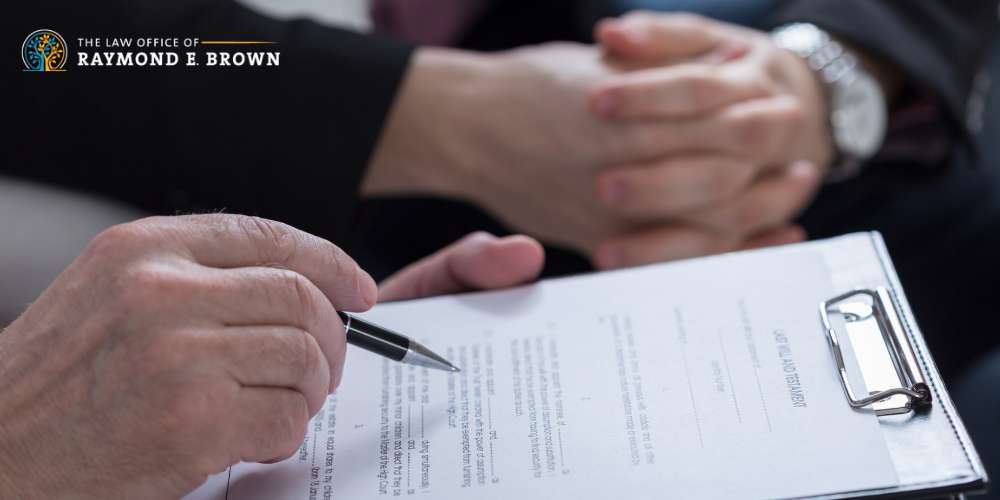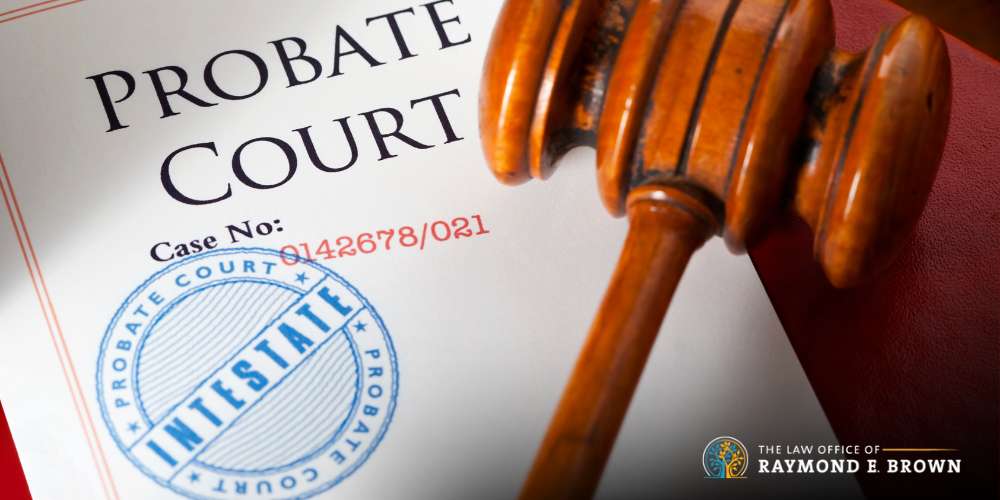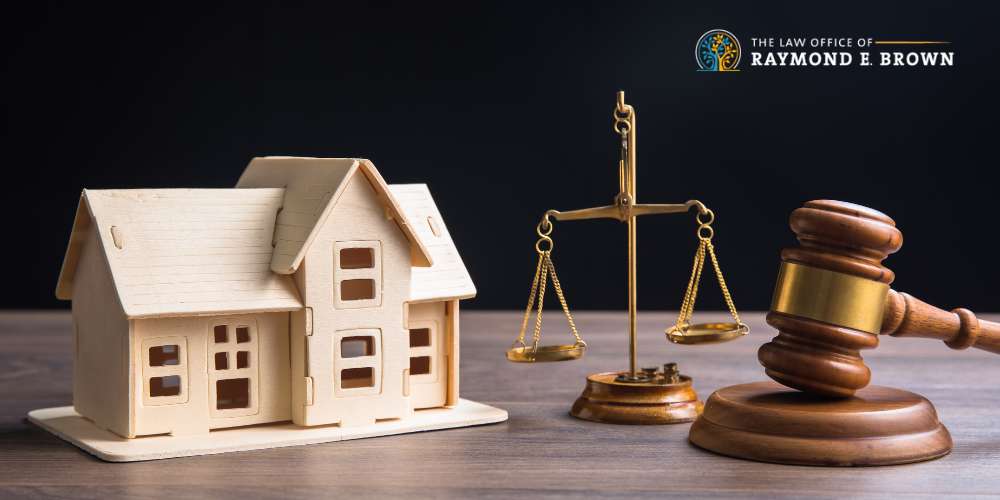As you get older, one question you may ask yourself is “Do I need a will?” to which the answer is almost always a resounding “yes.” At The Law Office of Raymond E. Brown in Annapolis, Maryland, we understand the importance of having a well-crafted last will and testament, and we’re here to help you draft and finalize a will suited to your specific needs and wishes.
A last will and testament is a legal document that outlines your wishes regarding the distribution of your assets and the care of any minor children after your death. It serves to ensure that all of your property is distributed according to your preferences, and that any minor children you have are taken care of by a trusted guardian, like a surviving spouse, sibling, or parent.
Life is unpredictable and it’s important to be prepared for the unexpected. If you are an adult with any kind of assets, or you have any children, creating a will can provide clarity and control over your estate, helping to avoid unnecessary complications regarding your personal property and children after your passing. A Maryland will and trust lawyer like Raymond E. Brown can help ensure that your estate is planned with care and precision.
Call The Law Office of Raymond E. Brown at (443) 554-9944 or reach out online today to schedule a consultation with a member of our team and start your estate planning journey today.
Why Having a Will is Important For Everyone
A valid last will and testament is one of the most important documents you can have established during your lifetime, as it ensures your final wishes are respected, even after you’ve passed away. It also protects your loved ones from the stress and uncertainty of the probate process.
Of course, there’s much more to it than that. Below, we’ll break down some of the most important reasons why everyone should have a will.
Control Over Personal Property and Asset Distribution
Having a will allows you to dictate exactly how your personal property and assets will be distributed after your death. Without a will, state laws determine the distribution of your property, including real estate, bank accounts, retirement accounts, or personal items, and this may not align with your wishes.
By clearly outlining your intentions and designating beneficiaries in your will, you can ensure that your assets go to the people or causes you care about most.
Streamline Probate Court for Family Members
A last will and testament can also help make the probate process painless. In other words, a well-drafted will can significantly simplify the probate court process for your loved ones, reducing stress and potential conflicts during an already difficult time. The will provides clear instructions on how to handle your probate estate, minimizing delays and ensuring that your family members receive their inheritances more quickly.
Appointment of Guardians for Minor Children
One of the most critical reasons to have a will is to appoint guardians for your minor children (if you have any, that is). Without a will, the court will decide who will care for your children, which again, may not align with your preferences. By naming a trusted guardian in your will, you can have peace of mind knowing that your children will be cared for by someone you trust.
An Annapolis guardianship attorney can help you establish guardians within your will and ensure your children (or adult dependents) are taken care of in the event that you are unable to care for them. This could include entrusting your child or children to a surviving parent, spouse, sibling, adult child, or close family friend.
Designation of an Executor
Yet another important reason to have a will is because it allows you to designate someone to be the executor. The executor of a will is responsible for carrying out your final wishes and managing the distribution of your estate. By choosing a trusted individual to manage your estate, you can ensure that your affairs are handled efficiently and according to your instructions, reducing the likelihood of errors or delays in the process.
An estate planning attorney can help you choose an executor, as well as help you and your chosen individual understand and carry out the duties of an executor. Your attorney can also help you establish a successor executor in the event that the primary executor is unable to manage your estate after your passing.
Minimizing Family Disputes
A clearly written will can also help minimize disputes among family members by explicitly outlining how your assets should be divided. Without a will, differing opinions and misunderstandings can lead to conflicts regarding how your affairs should be handled, which may strain relationships and cause undue stress.
By providing clear directives on how you want all your property to be handled, your will can help maintain family harmony during an already difficult time.
Expressing Personal Wishes and Specific Bequests
Last but certainly not least, a will allows you to express your personal wishes regarding specific beneficiary designations, giving you the chance to leave special assets to certain individuals or charitable organizations after your passing. Whether its ensuring that a precious family heirloom goes to the appropriate family member or that a substantial financial gift goes to the appropriate charity or organization, a will grants you the opportunity to make your final wishes known when you are no longer there to express them yourself.
Common Misconceptions About Wills
There are several common misconceptions about wills that can lead people to put off or even avoid creating one altogether. However, these assumptions can leave loved ones facing unnecessary challenges and potential legal disputes, all while grieving the loss of their family member.
Below are some common estate planning myths that we at The Law Offices of Raymond E. Brown often hear from clients regarding wills.
“I’m Too Young to Need a Will”
Many people assume that wills are only for the elderly or those with significant health concerns. However, unexpected events can happen at any age, and having a will ensures that your wishes are honored no matter what.
If your worried that your circumstances and intentions will change as you grow older, you’re probably right, but you can (and should) regularly update your will as you age and your life circumstances change. At The Law Offices of Raymond E. Brown, we can help younger adults like millenials create estate plans according to their unique circumstances and wishes.
“I Don’t Have Enough Assets for a Will”
An all too common question our estate planning attorneys hear is “do I need a will if I have no assets?” A will is still important even if you have no assets, or believe you have no assets. The truth is, almost everyone has at least one important asset to their name, whether it’s a home, vehicle, family heirlooms, or even just your personal belongings, no matter their value. A will allows you to designate where you want this property to go while also helping prevent potential conflicts among loved ones over even the most seemingly modest assets.
“Everything Will Automatically Go to My Spouse/Children”
It’s common to assume that your assets will automatically go to your spouse or children, but the reality can be more complicated. While this is often the case, it’s never guaranteed. Without a will, state laws dictate the distribution of your estate, which, as you now know, might not always align with your intentions. A will ensures that your assets are distributed according to your wishes, rather than through state laws.
“I Can Just Tell My Family What I Want”
It’s never a good idea to simply rely on verbal instructions or informal agreements regarding matters as serious as your last wishes. This can lead to confusion and disputes after your passing. A will provides a clear, legally binding document that outlines your wishes in detail, reducing the risk of misunderstandings and ensuring that your intentions are followed precisely.
What a Will Can’t Do
While a will can help in a lot of situations and aid in the estate planning process, it’s important to note that there are certain things that a will can’t do. Some of these include:
- Avoid probate court entirely
- Avoid estate taxes
- Provide instructions for funeral arrangements (typically the will is read after the funeral has taken place)
- Provide for potential incapacity
- Allow someone to make medical decisions on your behalf
- Supercede a beneficiary designation from certain other types of policies or agreements
- Protect assets from creditors
For example, under Maryland law, property held with joint tenancy (like a house co-owned by a married couple) will typically have a “transfer on death” designation, meaning the property will automatically pass to the other tenant named on the property. Normally, a will cannot supercede this type of transfer of property.
It’s important to discuss your plans with an experienced Maryland estate planning attorney who can help you better understand what a will can and cannot do as well as ensure that it, along with any other estate planning documents, are established correctly and in accordance with the law.
When Do You Need a Will?
Generally speaking, you should create a will as soon as you have any assets, dependents, or specific wishes regarding your property, and the sooner you create a will, the better. Whether you’re young, newly married, in the military, a parent, or simply own property, having a will ensures that your desires are honored and that your loved ones are protected.
Life’s unpredictability means it’s never too early to create a will, and remember, it can be updated as your circumstances change over time. An estate attorney can walk you through the legal process of establishing a last will and testament as well as help you make changes and additions to it as needed.
What Happens When You Die Without a Will in Maryland?
If a person dies without a will in Maryland, their estate is distributed according to the state’s intestacy laws. Dying intestate means that the state decides who inherits your assets, typically giving priority to your closest relatives, such as your spouse and children. Additionally, without a will, the court will appoint a guardian for any minor children, which may not reflect your preferences.
However, this distribution isn’t guaranteed to align with your personal wishes, and it can also lead to delays, increased legal costs, and potential disputes among family members.
Maryland Intestacy Laws
Maryland’s intestacy laws dictate how a person’s estate is distributed when they die without a valid will. Under state intestate laws, the distribution of assets depends on the presence of surviving relatives. Below is a brief overview of how intestate succession works in Maryland:
If you have a surviving spouse and surviving minor children:
- Your spouse typically receives half of the estate
- Your children receive the remaining assets
If you have a surviving spouse and no surviving children:
- The spouse inherits everything
If you have surviving children and your spouse dies:
- The children inherit everything
In cases where there are no immediate family members, more distant relatives may inherit your assets, or the estate may eventually go to the state. Although Maryland intestacy laws aim to provide a fair distribution of your assets, they may not match your personal preferences, making it essential to have a will in place.
How To Write a Will in Maryland
Writing a will in Maryland involves several key steps to ensure that your wishes are clearly documented and legally enforceable. The best way to do this is by seeking professional advice from a qualified estate planning attorney. They will guide you through the process and ensure your will is done right the first time.
If you create your own will, keep in mind that if any mistakes are may, it may lead to the will being unenforceable. In this case, you may end up not being able to have a say in the matter, as your estate would then be distributed in accordance with state law.
When writing a will, the first thing you need to list your assets and decide how or to whom you want them distributed. You’ll also need to appoint an executor, the person who will manage your estate, and, if you have minor children, designate a guardian.
Once your will is written, it must be signed in the presence of two witnesses who are not beneficiaries. The will should be stored in a safe place with your other important documents, and you should inform your executor of where everything is located.
Benefits of Seeking Legal Assistance for Your Maryland Will Creation
When creating your will, seeking legal assistance can offer you numerous benefits, ensuring that your estate plan is handled with proficiency and precision. An experienced attorney can help you meet the legal requirements for a valid will under Maryland law, ensuring that your will is enforceable.
They can also assist in addressing complex situations unique to your circumstances, such as managing blended families, significant assets, or specific bequests. Additionally, a Maryland estate planning attorney like Raymond E. Brown can help you establish trusts and other important estate planning tools in order to secure your estate, maximize your estate tax exemptions, and provide for your loved ones.
Call Experienced Annapolis Estate Planning Attorney Raymond E. Brown Today
Ensuring that your estate planning needs are met with precision and care is essential for achieving peace of mind, no matter your age or the number of zeros in your bank account. Attorney Raymond E. Brown, with his extensive experience in estate planning law, is dedicated to guiding you through the process of creating a will that reflects your wishes and protects your loved ones.
Don’t leave your estate to chance or rely on assumptions about how your assets will be handled–contact The Law Office of Raymond E. Brown to speak with an estate attorney on our team and begin your journey toward securing your estate today. Call (443) 554-9944 or contact us via our website to schedule a consultation with a member of our legal team regarding your will.





